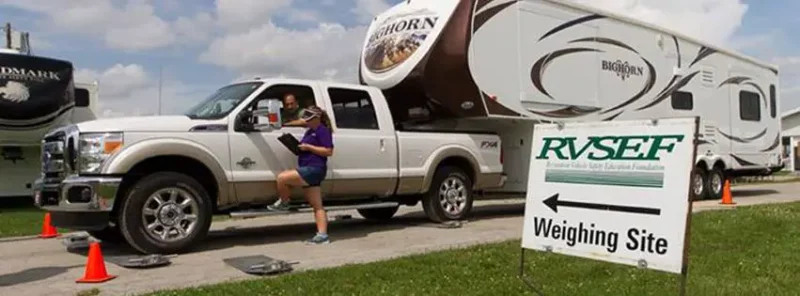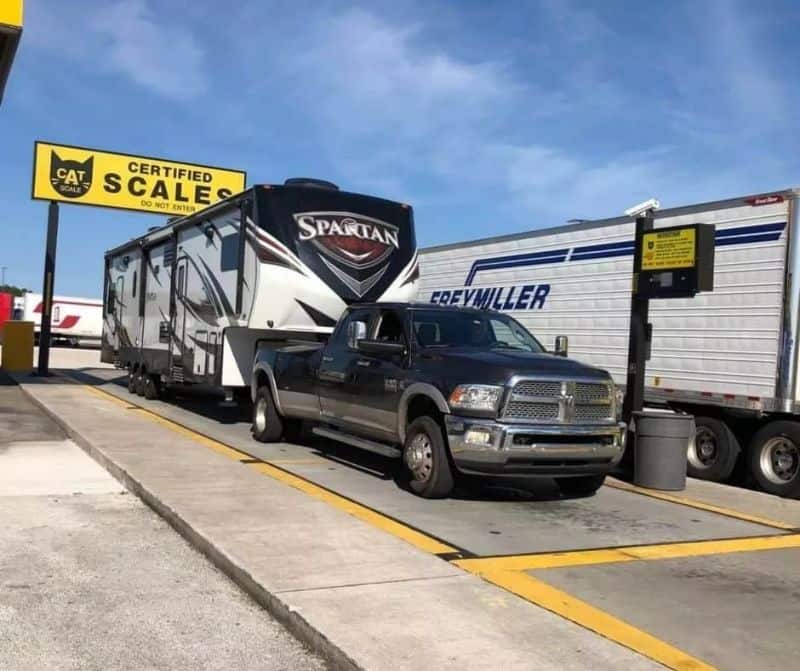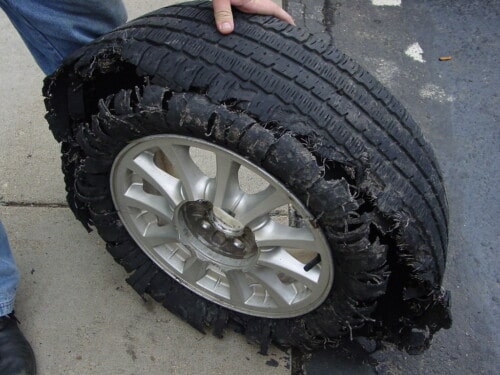A responsible RV owner should know how much their rig weighs, both empty and when fully loaded. Weighing your RV is the only way to know whether you are under the Gross Vehicle Weight Rating (GVWR) for your camper or motorhome. And remember, overloaded tires are the number one cause of blowouts!
Most RVers take their rigs to a CAT scale or other certified weigh scale. These are platform scales designed for heavy trucking. But CAT scales will only tell you how much your rig weighs in total. They can’t tell you how much weight rests on each individual wheel – and that’s where the danger lies!
Enter: Wheel position weighing.
Wheel position weighing (also called 4-wheel weighing) is the best method to weigh your RV. You will learn the exact weight, in lbs, resting on each tire.

How Do CAT Scales Work For Weighing RVs?
A CAT scale – or similar scale, such as a DOT Weigh Station – is a heavy-duty platform scale designed for the trucking industry. These are certified scales calibrated to a high level of accuracy.
By law (HB 44), highway weight scales must be accurate to within 0.01% of the capacity. Most CAT scales have a total capacity of 200,000 lbs. So at maximum weight, the CAT scale must be accurate to within 200 lbs.
However, that does NOT mean that your RV weight will be up to 200 lbs off! While it is true that smaller weights on larger scales tend to include a greater degree of uncertainty, calibration mitigates most of this effect.
In general, highway trucking scales are accurate to within +/- 0.1% of the applied weight, or two increments of discrimination, whichever is larger.
Because CAT scales show weight in increments of 20 lbs, that means you should expect that your RV could weigh 10-20 lbs more or less than what’s shown on the scale. Heavier motorhomes and 5th wheels could have as much as 40 lbs difference, but definitely not 200!
What’s the Problem with CAT Scales?
The problem with a CAT scale isn’t the accuracy – it’s the method! A simple platform scale simply cannot measure the weight on each wheel. It’s inherent in the method of construction.
As the RV Safety & Education Foundation points out, “It is possible to be within your Gross Vehicle Weight Rating (GVWR) and your Gross Axle Weight Ratings (GAWR), and still overload a tire at an individual wheel position.”

This is because you may be (incorrectly) assuming that weight is equally borne side-to-side and front-to-back. For example:
If your travel trailer has a GVWR of 7,700 lbs and your fully loaded camper weighs 7,600 lbs, then technically you’re under the GVWR – but what if the roadside tire carries an extra 10% of the weight? You could be overloaded!
(This is one reason RVIA amended their rules in 2021 requiring all new RVs to have radial-ply tires with an extra 10% reserve capacity. That reduces the likelihood that minor overloading or unequal weight distribution could cause a blowout.)
The bigger the RV, the higher the likelihood that an individual wheel could be overloaded. Some of the worst culprits are Super C and Class A motorhomes.
For this reason, weighing your camper or motorhome on a CAT scale could be a “false negative.”
Why Wheel Position Weighing Is So Important for RVs
Wheel position weighing is recommended by almost all major RV tire manufacturers, such as Goodyear and Michelin. Here’s what Goodyear says:
It is important to weigh your RV at a location that can provide axle-end specific weights. You should not expect to measure equal loads at both ends of the same axle, because floor plans and component locations vary significantly … Determine the heaviest end of each axle and use that load to select the inflation pressure for all tires on that axle.
GOODYEAR TIRE
Did you catch that last recommendation? Select the inflation tire of a pressure based on its actual load, because higher inflation pressure generally = stronger tire capacity.

Click here to see Goodyear’s Load/Inflation Table for their most popular RV tires. As an example, an ST225/75R15 Goodyear ST tire has a load limit of 2,150 lbs at maximum inflation pressure (65 psi) but only 1,610 lbs at 40 psi – that’s a 540-lb difference!
Many OEMs don’t check whether their RVs are correctly loaded from side-to-side. You need to check yourself!
If you’ve already maxed out your tire’s capacity, then you can at least repack your cargo to better distribute the weight.
Where Can I Get My RV Weighed?
There are several major programs that offer wheel-position weighing for RVs.
- The RV Safety & Education Foundation offers 4-wheel weighing at RV rallies and events across the country. Visit their schedule to learn about a rally near you. They are common at FMCA rallies. As of this writing, the cost is $60 for either motorhome or truck-and-trailer combination.
- The Escapees SmartWeight program has three locations in Florida, Texas, and Arizona (closed) that offer 4-wheel weighing. Prices range from $60-$80 depending on RV type and membership status.
Unfortunately, there are no easily accessible national corporate services that offer 4-wheel weighing for RVs. Below are a few smaller regional operations.
- RV Weigh offers wheel-positioning on-site and by appointment only. They set up an event at a campground, rally, or other seasonal location. See their schedule here. They are based out of Indio, California.
- Weigh To Go is based in Lake Havasu City, Arizona and offers wheel-position weighing for RVs all of sizes.
You can sometimes find 4-wheel position weighing services at local RV repair shops, such as Henderson’s Lineup in Grant’s Pass, Oregon; Leale’s RV Repair in San Jose, California; Weber Son & Service Repair Inc. in Strongsville, Ohio.
Some RV owners have reported success by calling the State Patrol/DOT office and requesting wheel-position weighing as a courtesy service.
Leave a Reply